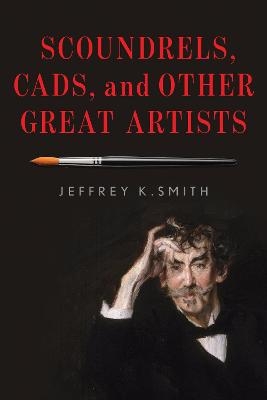
Scoundrels, Cads, and Other Great Artists
Seiten
2020
Rowman & Littlefield (Verlag)
978-1-5381-2677-6 (ISBN)
Rowman & Littlefield (Verlag)
978-1-5381-2677-6 (ISBN)
- Titel z.Zt. nicht lieferbar
- Versandkostenfrei innerhalb Deutschlands
- Auch auf Rechnung
- Verfügbarkeit in der Filiale vor Ort prüfen
- Artikel merken
Scoundrels, Cads, and Other Great Artists introduces people to great art by showing the more salacious side of the personal lives of great artists. The book not only tells the stories of twelve artists, but explores how to look at art and the separation between art and artist. This lively narrative is enhanced by over 100 full-color images.
Scoundrels, Cads, and Other Great Artists examines the lives of 12 great artists who were less than exemplary human beings in their lives outside of their art.
It explores the question, “Why do we like magnificent art from artists who were awful human beings?” For example, the great Baroque painter, Caravaggio, who developed the chiaroscuro style of painting, was in constant trouble with the law, even having killed a man in a dual. Frederick Remington, the great painter of the American West, was an incredible racist and bigot. His evocative paintings of native Americans on the trail on horseback give no hint of Remington’s enmity toward them or other ethnic groups in America. John James Audubon? He mostly shot the birds he painted; if in doing so, he damaged a part that he wanted to paint, he shot another one. Whistler and Courbet were philanderers and libertines.
Scoundrels introduces people to great art by showing the more salacious side of the personal lives of great artists over time. The book not only tells the stories of a dozen artists, but explores how to look at art and the separation between art and artist. This lively narrative is enhanced by over 100 full-color reproductions of great paintings and details from them.
Scoundrels, Cads, and Other Great Artists examines the lives of 12 great artists who were less than exemplary human beings in their lives outside of their art.
It explores the question, “Why do we like magnificent art from artists who were awful human beings?” For example, the great Baroque painter, Caravaggio, who developed the chiaroscuro style of painting, was in constant trouble with the law, even having killed a man in a dual. Frederick Remington, the great painter of the American West, was an incredible racist and bigot. His evocative paintings of native Americans on the trail on horseback give no hint of Remington’s enmity toward them or other ethnic groups in America. John James Audubon? He mostly shot the birds he painted; if in doing so, he damaged a part that he wanted to paint, he shot another one. Whistler and Courbet were philanderers and libertines.
Scoundrels introduces people to great art by showing the more salacious side of the personal lives of great artists over time. The book not only tells the stories of a dozen artists, but explores how to look at art and the separation between art and artist. This lively narrative is enhanced by over 100 full-color reproductions of great paintings and details from them.
Jeffrey K. Smith holds a chaired professorship at the University of Otago in New Zealand. He is also Associate Dean for University Research Performance at the University. Prior to Otago, he was Professor and Chair of the Educational Psychology Department at Rutgers University, where he had been a faculty member for 29 years. His AB is from Princeton University and his PhD is from the University of Chicago. From 1988 through 2005, he also founded and served as Head of the Office of Research and Evaluation at The Metropolitan Museum of Art in New York. He studies issues in the psychology of aesthetics, learning in cultural institutions, and educational assessment.
| Erscheinungsdatum | 10.05.2021 |
|---|---|
| Verlagsort | Lanham, MD |
| Sprache | englisch |
| Maße | 185 x 264 mm |
| Gewicht | 689 g |
| Themenwelt | Kunst / Musik / Theater |
| Geisteswissenschaften ► Geschichte ► Hilfswissenschaften | |
| ISBN-10 | 1-5381-2677-X / 153812677X |
| ISBN-13 | 978-1-5381-2677-6 / 9781538126776 |
| Zustand | Neuware |
| Haben Sie eine Frage zum Produkt? |
Mehr entdecken
aus dem Bereich
aus dem Bereich
Anforderungen an das digitalisierte Kulturerbe
Buch | Softcover (2023)
transcript (Verlag)
29,00 €
Buch | Hardcover (2024)
Wallstein Verlag
38,00 €


